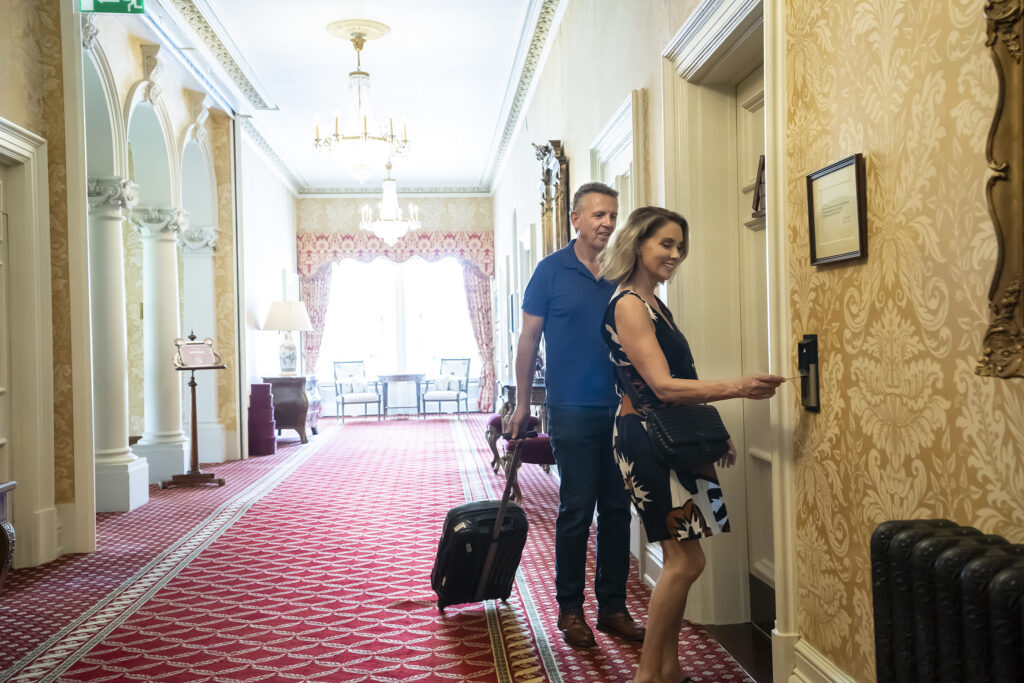As the UK emerges out of lockdown and heads down a ‘one-way road to freedom[1]’ people are ready to make the most of the upcoming holiday season. Whilst international travel is still largely off the table, UK hotels, hostels and B&Bs have been given the go ahead to re-open their doors, so people can finally get away for a long-awaited break.
After what’s been a devasting year, this is welcome news for the hospitality industry and holiday let owners are anticipating a surge in bookings as a result. In fact, a staycation boom is on the cards with 71%[2] of people intending to holiday in the UK this summer. Domestic holiday sales expected to reach a 10-year high, and people are set to spend around £7.1 billion on holidaying closer to home.[3]

A big part of this is down to continued uncertainty around foreign travel, which is deterring many from holidaying abroad this year. The government’s travel traffic light system means there are only a handful of ‘green list’ destinations deemed safe to visit without quarantine and visiting ‘amber’ or ‘red’ countries means people face the added expense of compulsory testing or 10-day stays in quarantine hotels[4].
So, with appetite for British staycations now at a high, Flogas Britain looks at how holiday let owners can make the most of this unique opportunity.
Publicise Covid Safety Measures
Whilst confidence is growing, people are still naturally feeling cautious about holidaying due to the pandemic. This means one of the key things they’re looking for when planning a staycation, is reassurance that accommodation is Covid-secure.
To allay any fears and appease more anxious travellers, holiday let owners should make sure they’re clearly communicating how Covid safe their accommodation is. People will be reassured to hear about any additional steps that are being taken, such as enhanced cleaning regimes, one-way systems, and staff training. Owners can even go one step further in boosting customer confidence and gain proper accreditation. For example, AA Covid Confident[5], which launched last year and is supported by 19 industry bodies, is a free accreditation scheme that’s open to all hospitality establishments.
Make the most of last-minute bookings
Since the pandemic hit, the industry has noticed a change in booking habits from holidaymakers. Concerned about shifting restrictions and enforced cancellations, they are now taking a much shorter-term approach to bookings and there’s been a notable increase in spontaneous travel. In fact, recent data shows that 69%[6] of UK bookings were being made within just seven days.
To make the most of this new trend, holiday let owners should ensure they have instant booking facilities in place and the ability to respond quickly to incoming requests. They should also make sure they’re publicising any last-minute availability as much as possible.

Offer enhanced booking flexibility
From local outbreaks to people being unwell, Covid continues to present a level of travel uncertainty and therefore heightens the risk of cancellations. As result, holiday let owners should make sure they’re offering flexibility to customers, as this will help boost bookings.
Flexible refund policies will allow people to book their holidays safe in the knowledge that they won’t lose out financially if they need to cancel due to Covid. It’s also worthwhile staying in touch with customers in the run up to their stay to make sure they’re still planning to attend. This will help avoid any last-minute cancellations that then can’t be replaced.
Welcome a new type of visitor
Thanks to Covid, holiday let owners are now catering to a new type of customer. The flexibility of working remotely matched with the desire for a change of scene or better views means people are starting to combine work and play by booking ‘flexcations’[7]. To make the most of this new trend, hotels and B&Bs should make sure they offer a convenient working space and most importantly, strong Wi-Fi.

Dogs are another new customer to consider. There’s been a staggering rise in people buying pets and 3.2 million[8] were bought during lockdown. Those with dog-friendly accommodation are set to benefit from this, as it’s expected to be a key search term for holidaymakers this year[9].
Maximise your marketing
Those keen to make the most of this year’s staycation boom need to maximise their marketing efforts. This starts with the website, and holiday let owners need to ensure it highlights key information, unique selling points (e.g., pet friendly), is easy to use and has up-to-date, eye-catching imagery.
This also extends to social media platforms, so ensure the likes of Instagram and Facebook are being used effectively to promote offerings. Owners can also use these channels to attract customers with enticing offers, such as off-season deals to drive revenue during quieter months.
Ultimately the best marketing tactic is guest experience so keeping the customer happy is key. Not only do happy customers return, but they inspire others to visit with all-important positive reviews. Whether it’s on Trustpilot, google reviews, TripAdvisor or their own platforms, owners should make sure they’re encouraging guests to review their accommodation when checking out.
[1] https://www.bbc.co.uk/news/live/uk-56149494
[2] https://www.boutiquehotelier.com/uk-staycation-boom-looks-set-to-continue-into-2021-new-research-finds/
[3] https://www.mintel.com/press-centre/travel/were-all-going-on-a-summer-staycation-demand-for-this-summers-staycations-is-expected-to-exceed-pre-covid-19-levels
[4] https://www.bbc.co.uk/news/explainers-52544307
[5] https://www.ratedtrips.com/aa-covid-confident#Supporters
[6] https://hotels.nridigital.com/the_new_hotelier_dec20/covid-19_hotel_management_booking
[7] https://www.generalitravelinsurance.com/travel-resources/flexcation.html
[8] https://www.bbc.co.uk/news/business-56362987
[9] https://www.cumberland.co.uk/news/2021-staycation-trends


